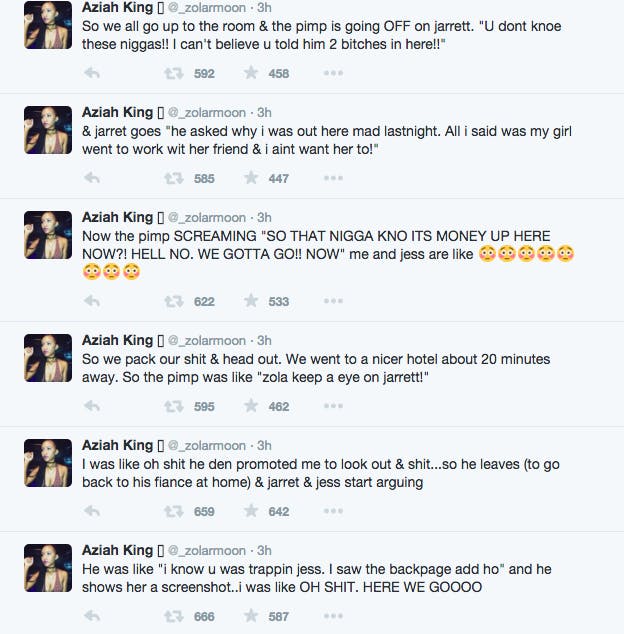People who’ve been on Twitter since it debuted a decade ago are fond of saying that it’s just no fun anymore, not much use, and all but totally dead.
But here’s a counter-theory: Those people are wrong as hell.
It’s true Twitter can’t make money, meaningfully curtail abuse, respond to its users’ stated needs, or elevate the eternal slap-fight that we jokingly call “discourse.” But financial sustainability and a sense of decorum are not what makes a social network worthwhile. The anarchic human element is, as ever, the driving force of virality, comedy, and, well, humanity—and while Twitter’s 140-character limit is a notoriously narrowing feature, an open-ended aspect of the platform has given rise to a new art form.
Ladies and gentlemen, if you are reading this, you live in the golden age of the Twitter megathread. And you probably already knew it.
The mechanics here are simple. While a single tweet can be very constricting, we’re not bound to single tweets. After tweeting once, we may reply to that tweet, and reply to that reply—always deleting our own handle—to create a connected cascade of tweets that thread together as a story.
https://twitter.com/worthyhoe/status/683426176606547968
https://twitter.com/worthyhoe/status/683426723220877312
https://twitter.com/worthyhoe/status/683428342276714496
This harks back to Web 1.0 message board culture—or mimics current Reddit and 4chan—where a self-selected group gathers to riff on any given joke or concept until it is utterly exhausted… and then sometimes keeps going: Beating a dead horse is often part and parcel of the gag.
Yet the Twitter megathread is a different beast. While many users chime in, a lone actor keeps the ball rolling in what my colleague Gabe Bergado has aptly described as a Twitter “soliloquy.” The continuing narrative is fueled by its own popularity, as indicated by likes and retweets, but also appears to exist in an intimate vacuum. Such is the case with 2015’s most infamous Twitter megathread, the trap tale of a Florida stripper named Zola.
Zola—real name Aziah Wells King—certainly exaggerated and likely invented much of this outrageous 148-tweet story, all of which she deleted shortly after it captured the attention of Twitter at large (thanks in part to the viral prestige of Black Twitter, a crucial driver of memeability).
But that hardly matters. Regardless of the Zola anecdote’s relationship to reality, it became the first social media thread optioned for a film. In February 2016, we found out that none other than confirmed millennial weirdo James Franco would direct the saga for the screen. “It reads like Spring Breakers meets Pulp Fiction, as told by Nicki Minaj,” observed David Kushner, whose follow-up feature for Rolling Stone attempted to pin down the facts of the case—and became the germ of the film itself.
Because as broad as digital entertainment is now, we still have content creators and content harvesters, artists and gatekeepers. Coverage on clickbait sites won’t make you any money, and when you post something for the entire Internet to read, it’s very difficult to keep it from becoming public property—or just another thread in the fabric of the Web itself. Nobody has managed to copyright a tweet, let alone a string of them.
Which means that no matter its source, subject, or agenda, a successful Twitter megathread exists outside even the author’s control.
If you hadn’t noticed the Twitter megathread before, you’re about to. Policy analyst Sean McElwee started one about toddlers as political props.
https://twitter.com/SeanMcElwee/status/693640411831779329
https://twitter.com/SeanMcElwee/status/693645285315186688
Or maybe you’ve read one of the many livetweetings about people breaking up in the worst possible places—on a plane, for example.
https://twitter.com/keegs141/status/635601861349896192
Guy: “is this really a surprise? Are you seriously surprised at this information?”
— Kelly Keegs (@kellykeegs) August 24, 2015
Girl: “Great. JUST GREAT. I’m so glad I paid 40 extra dollars to be on this fucking flight with you”
— Kelly Keegs (@kellykeegs) August 24, 2015
You may also get some kicks reading this notable thread from a guy who blamed his defective Apple Jacks on Applebee’s—with some success.
https://twitter.com/iGeha/status/697227736495091712
https://twitter.com/iGeha/status/697229920251088896
More recently, writer Dave Lozo detailed the absurdity of finding himself trapped in a DM thread with a bunch of random teens.
https://twitter.com/davelozo/status/719277562908815360
https://twitter.com/davelozo/status/719279095973076993
https://twitter.com/davelozo/status/719282625974820865
Why does this pattern of serialization work so well, and why is it having such a moment? Perhaps, after years of cryptic Facebook comments and free-floating Instagrams, inside-joke Tumblrs and indecipherable Reddit dramas, we are yearning for some context in which to place our experience. If Twitter is a cocktail party, then the Twitter megathread is that person holding us rapt in the kitchen with the best anecdote of the night.
The style, of course, continues to mutate. We’ve seen countless incarnations. Gizmodo writer Matt Novak, for example, unnerved many with a bit about the imminent presidency of Republican frontrunner Donald Trump. In contrast with King, Novak tweeted into this vein once a day rather than unleashing a one-day tweetstorm.
Which made it all the more uncomfortable.
hard to believe there’s just 564 days until donald trump is sworn in as president of the united states
— Matt Novak (@paleofuture) July 6, 2015
hard to believe there’s just 562 days until donald trump is sworn in as president of the united states
— Matt Novak (@paleofuture) July 8, 2015
hard to believe there’s just 560 days until donald trump is sworn in as president of the united states
— Matt Novak (@paleofuture) July 10, 2015
Were these automated, or did he remind himself to tweet an update every day? Did it matter? The dread simply accumulated, cold and pitiless. In the end, Novak halted the countdown early—for his own well-being.
hard to believe there’s just 314 days until donald trump is sworn in as president of the united states
— Matt Novak (@paleofuture) March 12, 2016
@binarybits for my own mental health
— Matt Novak (@paleofuture) March 28, 2016
Another seminal slow-burn thread came courtesy of Fran Hoepfner, editor for beloved satire sites the Onion and ClickHole, who for several months chronicled her adventures in living beneath a bunch of bros named Josh.
https://twitter.com/franhoepfner/status/627642193646354432
https://twitter.com/franhoepfner/status/636767478954242048
https://twitter.com/franhoepfner/status/669321673800159234
https://twitter.com/franhoepfner/status/686265043185451008
These occasional check-ins with the Joshes, for anyone who followed them—and it was easy to catch up at the midpoint, given that each tweet was attached to a string of those preceding, essentially reemphasizing the entire narrative for whoever had just stumbled across it in their timeline—took on a strangely moving aspect when Hoepfner prepared to move.
https://twitter.com/franhoepfner/status/698708436012249088
https://twitter.com/franhoepfner/status/701271059127885825
https://twitter.com/franhoepfner/status/701278373780267008
https://twitter.com/franhoepfner/status/704384815181774848
This finale solidified what was arguably the most satisfying plot arc in Twitter megathread history to date, and hinted at the profound possibilities encoded in its DNA: What we saw here was a drama that melded the serialized novels of Charles Dickens with the wry observations of a standup comic—or of Sei Shonagon, a medieval Japanese noblewoman whose witty diaries conveyed the complexity of life by lingering on infinitesimal detail.
Is this the look of a social platform whose days are numbered? Or could it be, instead, that media wonks keep declaring Twitter long past its prime because it has become a storytelling tool primarily for, and of, the people?
Yet all is not well in the megathread scene. For many, the unconfirmed details and dialogue transcribed by the humble content creators of Twitter, starting with the Zola saga, are just that: unconfirmed. And wherever fabrication holds sway, trust is lost and goodwill squandered.
So we’re left to ask ourselves if a story is worth the same as a “story.” There was, for instance, the “trapped in the closet” megathread, which struck a sophisticated, almost novelistic pose in framing itself as hearsay. By acknowledging a dubious relationship to reality, it allowed us all to believe.
https://twitter.com/XLNB/status/667169636606066688
https://twitter.com/XLNB/status/667170317412864000
https://twitter.com/XLNB/status/667170743600332800
https://twitter.com/XLNB/status/667171792075620352
Xavier Burgin, or @XLNB, went on to tell a raucous, farcical tale of double-crossed lovers and romantic betrayal that’s well worth reading in full, not least because it makes outstanding use of actor Alfonso Ribeiro’s face.
https://twitter.com/XLNB/status/667181588090761216
This in itself seemed like a callback to a different Ribeiro-based megathread that started with a real, believable premise (a failed hookup) and slowly escalated to the point of implausible, life-destroying tragedy.
https://twitter.com/yungburgers/status/658854950030544896
https://twitter.com/yungburgers/status/658859365139550208
https://twitter.com/yungburgers/status/658869330747129856
https://twitter.com/yungburgers/status/658870262205542400
In neither case did readers necessarily take the narrative at face value; each was simply entertaining. Lately, however, megathreads have blurred the fictive line. Some raised an eyebrow at a popular poop thread some weeks back that was either searingly honest or cleverly imagined.
https://twitter.com/_blotty/status/712127018649960452
https://twitter.com/_blotty/status/712127365074296832
https://twitter.com/_blotty/status/712128076587671553
https://twitter.com/_blotty/status/712128639136079872
Even more suspicion surrounded the late-night McDonald’s drive-thru yarn of one Josh Raby, who just wanted a milkshake but was confronted with a surreally sexual fast-food horrorshow of Lynchian dimensions.
https://twitter.com/JoshRaby/status/719404433164144640
https://twitter.com/JoshRaby/status/719408716911665153
https://twitter.com/JoshRaby/status/719412465067560960
After his tweets went viral, Raby said, he was hounded by people who didn’t believe him—and even assumed he was part of a marketing scheme.
https://twitter.com/JoshRaby/status/719612954967191553
https://twitter.com/JoshRaby/status/719659777295560706
But Raby had confessed to any journalist who asked that he’d made “writerly choices” and eventually clarified that many details were false or exaggerated. Like many people on Twitter, he was just goofing around.
https://twitter.com/JoshRaby/status/720253628817125380
https://twitter.com/JoshRaby/status/720254201587179522
https://twitter.com/JoshRaby/status/720255288125820930
Yet the backlash preceding this clarification was extreme. People on the Internet like to feel smart, and being first skeptic to scream “fake!” at a piece of enjoyable content that no one claims as verified fact is, somehow, a major source of this self-esteem. Weird Twitter luminary Leon Chang (@leyawn) went a more subtle route, spinning his own transparently bogus shaggy-dog story, which by the end was borrowing liberally from the 1997 Bruce Willis action-sci-fi flick The Fifth Element.
because college is fucking expensive. and i’m poor. it’s spring. i’ve got the windows down and the sunroof open, stopped at a light
— leon (@leyawn) April 11, 2016
fast forward a week later, i get a call from a local radio show that i won a trip for two to a booze cruise. i don’t even remember entering
— leon (@leyawn) April 11, 2016
they shoot gwen stefani. the girl i’m with rushes to her body and pulls these fucking ancient stones from gwen’s stomach. what the fuck
— leon (@leyawn) April 11, 2016
we hop in my cab and drive to the airport. the priest and his assistant meet us there, and we fly to egypt, and go to the pyramids
— leon (@leyawn) April 11, 2016
anyways that’s my true story. it all really happened. please retweet, like, and share with every media publication you work for. thanks
— leon (@leyawn) April 11, 2016
It was an amusing send-up of this now-dominant Twitter genre, though also a strange tack to take for someone who regularly dupes the gullible with his Photoshop skills. Does it matter who “falls for” what? Presumably, journalistic outlets should be held to a higher standard than any lone Twitter presence with an egg avatar and a dozen followers—yet by and large, these tall tales seem like harmless fun. They’re urban legends 2.0, and they’re not even worth debunking. They’re just the texture of life today.
And, like anything else on the Internet, they cannot last forever. Twitter, and we, will go on changing. The formula is destined to atrophy.
So tell your story while you can.



